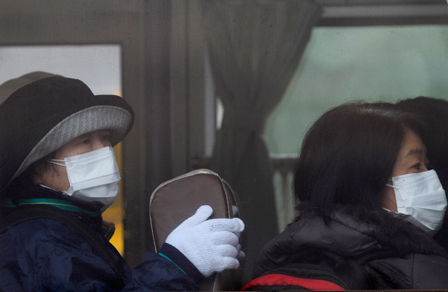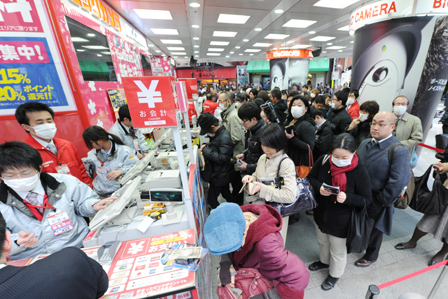Erstellt am: 17. 3. 2011 - 17:59 Uhr
Between Rational Fear and Blind Panic
In the United States food supplement outlets, including a company calling itself "nuke-pills", have run out of the potassium iodine tablets that can help protect against thyroid damage caused by radiation. They just haven't been able to keep up with the massive surge in demand for the "anti-radiation pills." Chinese supermarket shoppers have been scrumming to get hold of simple iodized salt which experts say wouldn’t help against radiation poisoning anyway. In Austria, eight times zones away from the disaster area, shoppers have reportedly been buying Geiger counters to measure the risk they face from the nuclear problems in Japan.
Here is a helpful guide to the health impacts of the Fukushima disaster from the Australian Radiation Protection and Nuclear Safety Agency
Professor Gerry A Thomas, who holds the chair in molecular pathology of Imperial College London, thinks this is sort of panic buying is nonsensical: “everyone is petrified of radiation – irrationally so.”
Workers Face Future Cancer Risk
That doesn’t mean, of course, that she is playing down the risks faced by workers at the plant. In the words of Ian Sample of the Guardian’s science desk the crisis “is certainly grave and immediately dangerous for those at the site who are fighting to make the crippled reactors and fuel storage ponds safe.” They are working in rapidly revolving changeover shifts to limit their own exposure to radiation. Andy Coughlin of New Scientist says the risks to workers depend on for how long the leaks continue, with the amount of radiation being multiplied by the time to which they have been exposed to it. The maximum radiation level measured around the plant so far has been 400 millisieverts per hour and authorities say one worker received a radiation dose of 106 millisieverts.
According to Professor Richard Wakeford, an expert in radiation exposure at the University of Manchester, that dose was likely to raise the lifetime risk of fatal cancer by 1%.

EPA
But although the US has implicitly criticized the Japanese authorities for making the evacuation zone too small (they have recommended that their nationals living within 80km of Fukushima evacuate rather than just those inside the current 20km exclusion zone), Professor Gerry Thomas points out that the amount of radiation drops off very quickly from the source on what is called an inverse square law. With the levels of radiation, although high, are nowhere near comparable to those released by the Chernobyl blaze, the experts say that this drop off means that people outside of Japan should not be worrying about their radiation exposure. Indeed Thomas says that taking iodine supplements if you are not about to be exposed to a large dose of radiation can be harmful, disturbing the balance of your sensitive thyroid gland.
"people's perception of radiation scares them"
Gerry Thomas is dismayed by misconceptions about radiation – which is at low levels ever-present in the Earth’s atmosphere coming from sources such as rocks, soil, and the sun. She says it's people's perception of radiation that scares them and the media plays on that fear. But she admits that nuclear authorities often have themselves to blame. On the 14th of March the Japanese government was assuring the world that no radiation had escaped while an American military ship with sensitive radioactivity sensor was detecting low levels of radiation 100 miles off the Japanese coast. The navy said the amount detected was not dramatic – less, in fact, than the radiation exposure received from about one month of exposure to natural background radiation from, but the story, even before the explosion that is said to have exposed spent fuel rods, has shed doubt on the openness of the Japanese authorities who have been accused of playing down the significance of leaks in the past.
Professor Gerry Thomas on radiation fears
Dieses Element ist nicht mehr verfügbar
My 2006 trip to Chernobyl to investigate the consequences of Europe's biggest nuclear disaster.
It might be irrational for people in the USA to be panic buying iodine now but, since Chernobyl it is not irrational for people to fear that they are being lied to about nuclear issues. “The problem at Chernobyl was that the authorities were in total denial about what was going on and pretended nothing was serious,” says Andy Coughlin of New Scientist. One of the main problems in the 25 years since Chernobyl has been the raised incidence of thyroid cancer in the areas of Ukraine and Belarus surrounding the plant, particularly among people who were under the age of 5 at the time of the explosion.
The UN's scientific committee on the effects of atomic radiation recently described this rise as “the only substantial medical legacy of Chernobyl in the general population.” These cancers could have been avoided if the Soviet authorities had been open about the scale of the problem and handed out iodine tablets while warning parents that they should not let their children drink milk from the affected area. Radioactive iodine, one of the most harmful substances emitted in nuclear leaks, has a half-life of 8 days – the danger could have been minimized with the tablets – but instead, for weeks, the authorities buried their heads in the sand.
Our mistrust is understandable, but it is misleading to compare the two disasters. As the Guardian’s Ian Sample points out the reactors have been switched off almost a week now – they were automatically shut down when the quake struck - so there is less fresh radioactive material around and “each core is contained within a 20cm-thick steel container, which is then protected by a steel-lined reinforced concrete outer structure." These casings have been reportedly breached in places, but not destroyed. "Even in the case of a meltdown, these measures should at least limit the amount of radiation released.”

EPA
Health Effects of Radiation/ Andy Coughlin on the levels in the exclusion zone
Dieses Element ist nicht mehr verfügbar
- Neuigkeiten auf news.ORF.at
- Aktuelle Kurzmeldungen
- ORF Sondersendungen zum Beben: Die Nachrichtensendungen gibt es auch in der ORF TVthek
- Vorher/Nachher-Fotostrecke auf abc.net.au
- Auf TW1 und in der TVthek zeigt der ORF Berichterstattung des japanischen Senders NHK
- Alle FM4 Artikel auf einen Blick: fm4.orf.at/japanbeben
Eine Übersicht über verschiedene Spendenmöglichkeiten:
Spenden für Japan
The situation at Fukushima is still volatile and workers still battling by the minute against a more severe radiation leak. The fear is that the worst is still to come. As Sample explains, any explosion could launch uranium and plutonium fuel into the air. “These would remain as particles and would settle near the plant. They are grim environmental contaminants, and could see vast areas ruled out of bounds” he says, but adds that “they are only a serious problem to people if they are ingested or inhaled. Once again the message seems to be that the danger is unlikely to extend beyond the immediate area.
Many Japanese have reportedly reacted with incredulity as foreign embassies have told their citizens to consider leaving even Tokyo. It’s true that 10 times the normal background radiation levels have been detected in the capital but radiation experts says that such a dose is far below the levels that can harm health. A British expat tweeted the BBC to complain that “it is only foreign people, stoked by the media and now knee-jerk reaction international embassies that are starting to panic and flee.”
When an Austrian Patrick Hiehs, in Yokohama, told us that the nuclear crisis wasn’t his main concern, he was pilloried in some of the postings, but with ten thousand people feared dead from the quake and tsunami and hundreds of thousands left homeless isn’t that a rational response? If radiation levels spike in the coming days, then maybe the embassies will be applauded for foresight, if not they might be accused of creating unhelpful panic.
What Are Millisieverts? And Should Tokyo Be Scared Of Them?
What to conclude? Certainly the nuclear workers who have stayed behind to battle with the crisis in Fukushima deserve to be called heroes. Certainly we need to keep our eye on radiation levels in and around the exclusion zone in Japan. But buying anti-radiation pills outside the country is clearly absurd and does point to an irrational relationship with radiation. To put this in perspective, health experts have pointed out that we don’t evacuate our cities when small particle pollution spikes, although that has a proven effect on mortality rates. Passive smoking, a world-wide killer of 600.000 a year according to the WHO, is often treated as a trivial issue.
"We have to be very careful how we handle radioactive material"
In the end, with radiation it all comes down to the dose, says New Scientist’s Andy Coughlin. “Life has evolved on this planet with lots of radioactivity around the place. We are pretty hardy,” he says. It’s just when you are using nuclear reactors to generate power you are creating material in amounts that you wouldn’t find in nature, “so we have to be very careful how we handle it.”
Hi-tec Japan thought it had been careful, so the lesson that many people have taken away so far is that you simply can't be careful enough. Today German Chancellor Angela Merkel told parliament that her goal was "to reach the age of renewable energy as soon as possible".


